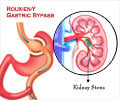Researchers have shown that the thresholds limiting bariatric surgeries to high-volume centers disproportionately restrict access for poor and underinsured patients.
UT Southwestern Medical Center researchers have shown that the thresholds limiting bariatric surgeries to high-volume centers disproportionately restrict access for poor and underinsured patients, populations that are among the most in need of them.
Government-imposed restrictions currently mandate a 125-case annual threshold for facilities permitted to perform bariatric surgeries under Medicare and Medicaid because some studies have identified better outcomes for centers performing large volumes of bariatric surgeries. But most bariatric surgeries for the poor – about 60 percent – are performed in low-volume centers.“Restricting surgeries to high-volume centers has the effect of limiting bariatric surgery as an option for many poor and underinsured who rely on Medicare and Medicaid,” said Dr. Edward Livingston, senior author of the study appearing in the October edition of Archives of Surgery. “This is a population that stands to gain the most from bariatric surgery.”
Dr. Livingston is chairman of gastrointestinal and endocrine surgery at UT Southwestern and chairman of the Veteran’s Administration Central Office Bariatric Surgery Work Group.
Nearly three quarters of hospitals offering bariatric surgery are considered low-volume facilities under the 125-case threshold, thereby leaving few centers available for impoverished populations.
Yet low-income patients, particularly those in rural areas, may not be able to travel to the limited number of high-volume centers due to costs such as gas, access to public transportation or personal vehicles, or health matters that limit their travel, Dr. Livingston said.
Such restrictions further limit medical expertise for morbidly obese patients by reducing the number of hospitals well-equipped and properly staffed to handle the special needs of these cases. “Regionalization results in the global reduction of experience in managing obese patients at a time when obesity is rapidly increasing in the population,” the study notes.
Advertisement
Researchers found that statistical sampling methods used in the handful of studies favoring high-volume centers skewed results by amplifying a small number of excess deaths in very low-volume facilities. Databases used in the studies typically had sparse information on individual patients’ backgrounds. Accounting for the specific health risks of patients, however, often eliminates the advantages seen for high-volume centers, the analysis showed.
Advertisement
“Restricting cases to high-volume centers isn’t going to have a profound effect in limiting the number of deaths, but would have a profound effect in limiting accessibility to bariatric surgery,” Dr. Livingston said. “More likely, the surgeon’s cumulative experience and access to multidisciplinary teams of doctors available before, during and after surgery result in better outcomes.”
Rather than limiting procedures to high-volume centers, bariatric programs should be judged by risk-adjusted outcomes, such as the National Surgical Quality Improvement Program, he said.
That’s important because studies indicate that non-surgical therapies for morbidly obese patients are uniformly unsuccessful for sustained weight loss. In addition, despite increasing numbers of bariatric surgeries performed, they are still dwarfed by the eligible population. The Centers for Disease Control and Prevention estimates that nearly one-third of adult Americans (more than 60 million people) are obese, with nearly 5 percent of adults classified as extremely obese.
Bariatric surgeries, which are usually reserved for those more than 100 pounds overweight, can help not only with weight, but related health problems. Obese adults are at increased risk of diabetes, hypertension, stroke and even some cancers.
Weight-loss surgeries have become more common as obesity has increased, with more than 140,000 gastric bypass procedures now performed in the U.S. annually.
UT Southwestern’s Center for Minimally Invasive Surgery is one of only seven facilities in North America, and the only one in Texas, to be accredited by the American College of Surgeons. The American Society has named it a Bariatric Surgery Center of Excellence for Bariatric Surgery.
Surgeons at UT Southwestern performed the first laparoscopic gastric bypass surgery in Texas in 1999 and were the first in the Dallas area approved to perform the Lap Band procedure in 2001. UT Southwestern’s bariatric specialists have performed approximately 4,000 procedures and have trained more than 100 surgeons from across the U.S.
Other UT Southwestern researchers involved in the study were Dr. Linda Hynan, associate professor of clinical sciences, and Alan Elliott, faculty associate in clinical sciences. Scientists from the University of California, Los Angeles’ department of biomathematics also contributed.
Source-Eurekalert
GAN/C









